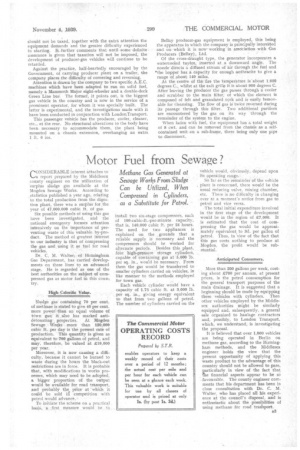Motor Fuel from Sewage ?
Page 29

If you've noticed an error in this article please click here to report it so we can fix it.
Methane Gas Generated at Sewage Works From Sludge Can be Utilized, When Compressed in Cylinders, as a Substitute for Petrol.
CONSIDERABLE interest attaches to report prepared by the Middlesex county engineer on the utilization of Surplus sludge gas available at the Mogden Sewage Works. According to ,statistics published a year ago, relating to the total production from the digestion plant, there was a surplus for the year of 47,000,000 cubic ft. of gas
Six possible methods of using this gas have been investigated, and the national emergency focuses attention intensively on the importance of preventing waste of this valuable by-product. The method of greatest interest to our industry is that of compressing the gas and using it as fuel for road vehicles.
Dr. C. M. Walter, of Birmingham Gas Department, has carried developments on these lines' to an advanced stage. He is regarded as one of the best authorities on the subject of -compressed gas as motor fuel in this country.
High Calorific Nialtke.
Sludge gas containing 70 per cent. of methane is stated to give 40 per cent. more power, than an equal volume of town gas; it also has marked antidetonating properties. At Magden Sewage Works more than 150,000 cubic ft. per day is the present rate of production. This quantity is given as equivalent to 700 gallons of petrol, and may, therefore, be valued at £19,000 per year.
Moreover, it is now causing a difficulty, because it cannot be burned to waste during the hours the black-out restrictions are in force. It is probable that, with modifications in works processes, which may need to be adopted, a bigger proportion of the output would be available for road transport, and probably the price at which it could be sold in competition with petrol would advance..
To initiate the scheme on a practical basis, a first measure would be
install two six-stage compressors, each of 100-cubic-ft.-per-minute capacity, that is, 140,000 cubic ft, per 24 hours. The need for two appliances is explained on the grounds that a reliable supply is necessary and the compressors should be worked for alternate periods. Besides this plant, four high-pressure storage cylinders, capable of containing gas at 5,000 lb. per sq. in., would be necessary. From them the gas would be transferred to smaller cylinders carried on vehicles, in like manner to the methods employed for town gas.
Each vehicle cylinder would have a capacity of 1.75 cubic ft. at 3,000 lb. per sq. in, giving energy equivalent to that from two gallons of petrol. The number of cylinders carried on the
vehicle would, obviously, depend upon its operating range.
So far as the remainder of the vehicle plant is concerned, there would be the usual reducing valve, mixing chamber, etc. There is no difficulty in changing over at a moment's notice from gas to petrol and vice versa.
The total initial expenditure involved in the first stage of the development would be in the region of £7,000. It is estimated that the cost of compressing the gas would be approximately equivalent to 3d. per gallon of petrol. Thus, in view of the fact that this gas costs nothing to produce at Mogden, the profit would be substantial.
Anticipated Consumers.
More than 200 gallons per week, costing about £700 per annum, at present prices, is the petrol consumption for the general transport purposes of the main drainage. It is suggested that a beginning should be made by equipping these vehicles with cylinders. Then other vehicles employed by the Middlesex authorities might be similarly equipped and, subsequently, a general sale organized to haulage contractors and, possibly, to London Transport, which, we understand, is investigating the proposal.
It is believed that over 1,000 vehicles are being operated in Berlin on methane gas, according to the Birmingham methods, and the Middlesex engineer holds the view that the present opportunity of applying this waste product to the advantage of this country should not be allowed to pass, particularly in view of the fact that he financial aspects appear to be so favourable. The county engineer comments that his department has been in close consultation with Dr. •C. M. Walter, who has placed all his experience at the council's disposal, and is enthusiastic about the possibilities of using methane for road tratisport.




























































